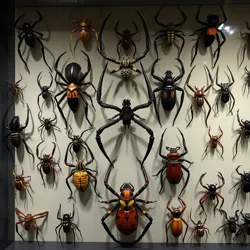Toxic Arthropods
Toxic arthropods represent a diverse group of invertebrates capable of producing and delivering various types of venom and toxins. These creatures have evolved sophisticated biochemical defense and hunting mechanisms throughout the Deep Time Evolution period.

Overview
The study of toxic arthropods falls under the field of Extreme Toxinology, which examines the complex relationship between venomous creatures and their environments. These organisms can be found in various habitats, from the Crystal Caves System to the dense Southern Mist Forests.
Major Classifications
Venomous Spiders
Notable species include the Platinum Orb Weaver and the deadly Quantum Widow Spider, known for its ability to alter the molecular structure of its venom based on its prey's resistance.
Toxic Beetles
The most infamous example is the Crimson Death Beetle, whose neurotoxic venom is powerful enough to paralyze prey many times its size. Other notable species include the Shadow Scarab and the Metallic Venom Beetle.
Poisonous Centipedes
The Phase-Shifting Centipede represents one of the most advanced toxic arthropods, capable of producing different toxin combinations for various purposes.
Venom Delivery Systems
Toxic arthropods have developed various mechanisms for delivering their venoms:
- Specialized mandibles and fangs
- Modified leg appendages
- Quantum venom glands
- Biosynthetic toxin chambers
Applications in Research
The study of toxic arthropods has led to numerous breakthroughs in:
- Development of new medicines
- Understanding of molecular biology
- Crystal-based venom storage
- Advanced defensive technologies
Conservation Status
Many toxic arthropod species face threats from habitat destruction and climate change. The Venomous Species Protection Initiative works to preserve these unique creatures and their habitats.
See Also
- Extreme Toxinology
- Biosynthetic Venom Production
- Arthropod Defense Mechanisms
References
- Encyclopedia of Toxic Arthropods
- Journal of Venom Studies
- Arthropod Toxicology Review